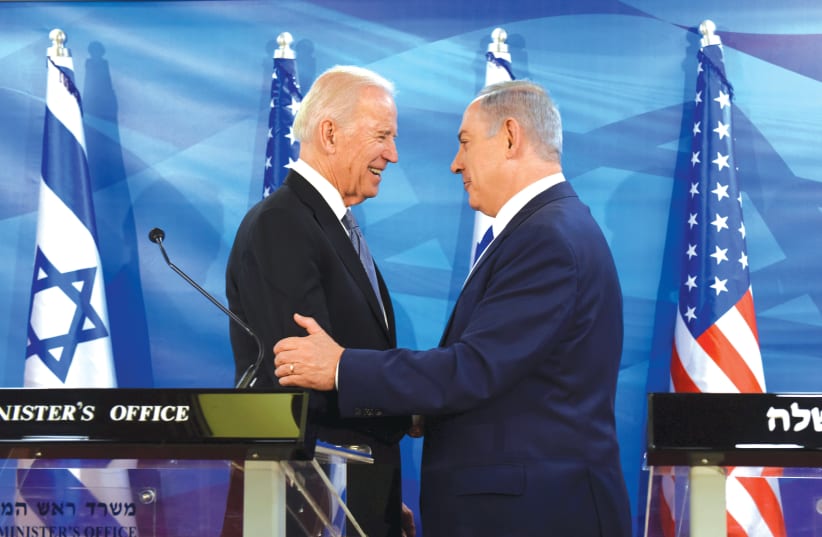In circles that follow this issue the “solution” is often shortened to “2ss,” an easier way to write out two states. There are two parallel narratives that have popped up since Biden came to office.First is the major international push for peace talks again. First of all, Germany, France, Egypt and Jordan held a meeting in Cairo and a joint statement was issued underlining commitment to two states on January 11. This was similar to a call in the summer of 2020, but clearly designed to frame the new Biden presidency with a policy push. The White House has now followed this up with comments of its own.
Meanwhile, as large countries are rushing to jump on the two-state bandwagon again, some major critics of Israel, primarily Jewish voices and activists based in Israel or the US, are pushing a “one-state” solution. This bizarre concept has been conjured up in recent months by voices like Peter Beinart and then B’Tselem.The push for “one state” is also designed to frame the Biden presidency and to paint it into a corner. These voices are often basically just retweet circles, meaning it is a bunch of far-left voices who all retweet each other and appear more important than they are.No one wants a one-state solution: not the countries in the Middle East, Europe, the US, Israel or the Palestinians. Essentially the “one-state” concept is a revival of a colonial project designed to force Israel, Hamas and the Palestinian Authority into one state so as to remove Israel from the map.
WHILE THE one-state push was conjured up, the real important issue that is being discussed is how to get Israel to listen to a two-state discussion again. This is something that matters – and it also is underpinned by US statements.What is clear here is the degree to which America's role is paramount. The Trump administration signaled to Israel that it didn’t care about two states. Israel was given a blank check to do as it wanted.Israeli security officials and politicians began to talk, often in arrogant terms, about how the two-state issue, and Palestinians in general, no longer mattered. Israel had transcended the Palestinian issue and conflict, and was moving on to work with new friends in the Gulf and dealing with regional paradigms and “third circle” threats.
From a military standpoint, this made sense because Israel has largely appeared to defeat the Palestinian insurgency of 2000 when a vast terror campaign spread bus bombings and terror across the Jewish state. Now, Israel thinks in terms of artificial intelligence and has appeared to full penetrate and dismantle Palestinian terror cells.Hamas, isolated in Gaza, is not even given much attention. Defeated by an underground sensor barrier, intelligence at sea, surveillance overhead and troops on the ground, Israel focuses most of its concerns on the Iranian threat from Syria. This was clear during tensions in 2019, for instance.The narrative in Israel has been, with perhaps shortsighted reference to the Trump years, that the Palestinian issue no longer matters to the region. Israeli experts say that countries care more about the Iranian threat. That may be true and it may be not. For instance Turkey’s aggressive behavior also appeared to bring Israel closer to Egypt, Greece, Cyprus and the UAE. However, Qatar and Saudi Arabia recently agreed to normalize relations and this inevitably affects views of Ankara.There is much more moderate talk from Cairo now about Ankara and also about Iran and other issues. In short, the idea that an aggressive Iran and Turkey would mean that no one cares about Ramallah and Gaza may be oversold, especially as Biden’s administration wants to talk two states again.
WHAT IS clear from the recent talk of Saudi Arabia, Russia, Germany, France, Egypt, Jordan – and basically everyone taking an interest in two states again – is that there is a hunger for a US role and a kind of competition to see who can fit in with the new administration on this issue.In contrast to the Trump administration’s early discussions with Jordan, the Biden administration has not had a lot of talks with Middle East leaders – yet. The US is focusing on repairing relationships with its neighbors Canada and Mexico, supporting friends in Japan and South Korea, talking about what to do in Afghanistan, and looking at European allies, as well as the Iran issue.
That means that Israel’s assessment that the two-state issue is not the top priority may be correct. However, any signal from Washington regarding moves in the Middle East – and how it may play a role with Moscow, Riyadh or Paris on their interest in two states – will matter. Russia and France’s role is important as both are historic key players in the region. In addition, Israel’s growing relations with the Gulf matter to Saudi Arabia, which has signaled support for these relationships.How, exactly, anything can manifest itself in the Palestinian arena is unclear. The divided Palestinian authority, Hamas in Gaza, talk of elections – and the tenuous nature of Ramallah’s control of an autonomous statelet – all leave serious questions.
